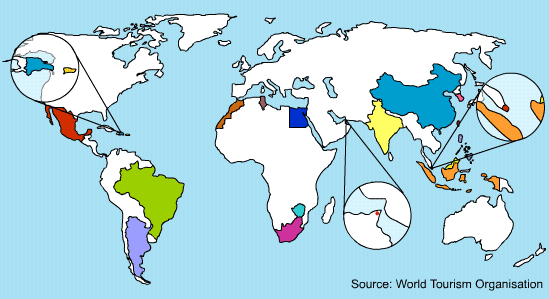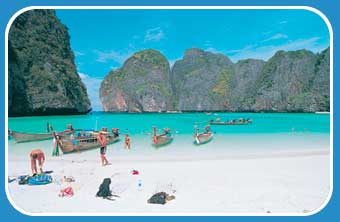|
Today, more and more people take holidays abroad. For poorer countries that have few development opportunities, tourism may provide an important way of improving the quality of life for local people.
 for a fact file, maps and graphs on tourism. for a fact file, maps and graphs on tourism.
Some tourists believe that the attractions of LEDCs can beat the best of the developed world.
Click on the highlighted countries on the map to find out today's top twenty tourist destinations in the developing world, and how many tourists visit these countries each year:

Why the developing world?
Cheaper, more frequent air travel, package holidays and on-line booking have also helped to reduce the cost of travelling to long-haul destinations. Dream holidays in Thailand, The Gambia or Caribbean islands like St Lucia are no longer just for the rich and famous.
| TV programmes, films, newspaper articles and websites have all fuelled interest in exotic holidays. For example, tourists have flocked to Phi Phi Leh island, Thailand where the film, "The Beach" was filmed. |

©Paul Quayle/Panos Pictures.
|
New Opportunities
Many tourism services are labour-intensive. This means that tourism creates many jobs in hotels, entertainment and transport in LEDC destinations. Other parts of the economy can benefit too. Construction workers build airports, roads and hotels, and local artisans make souvenirs. In theory this should spark a multiplier effect as the money raised from tourist spending can be invested in the local economy. However, the reality is often different. Most of the jobs created by tourism are seasonal, low skilled and low paid.
New Demands
Tourists may be far from home, but they still demand familiar comforts. Therefore in order to attract tourists, LEDCs have to spend money on the country's infrastructure to meet their high expectations.
Infrastructure Needs
Hidden Costs
Other indirect costs of developing tourism are less obvious and more difficult to measure. Hotel and road construction can destroy wildlife habitats, ruin the scenery, and increase air and noise pollution. Local cultures can suffer too as they are commercialised to entertain tourists. If these costs known as 'externalities' are overlooked the destination may lose its holiday appeal altogether.
| Pressure on water supplies is a major externality, especially in dry climates like here in Kenya. Over-use of water resources can lead to severe shortages, leaving local people struggling to obtain enough water to grow food. |

© Guy Mansfield/Panos Pictures.
|
Most tourists are unaware of these impacts and do not have to pick up the bill. Instead, local people have to bear the brunt long after the tourists have gone home.
 An important externality from tourism is the air pollution caused by so many people flying long distances. An important externality from tourism is the air pollution caused by so many people flying long distances.
|

to find out more.
|
|
Making Tourism work for the Poor
Despite the obstacles, tourism could enable poor communities in LEDCs to earn money from their culture and natural resources, which may be all they have. But the challenge is to manage tourism in ways that can unlock these opportunities for the poor.
In recent years, much attention has been given to eco-tourism, a strand of tourism that has been growing by as much as 30% a year worldwide. But the growth of eco-tourism in Belize shows that it is not necessarily a magic cure, and it only represents a small share of the total tourism market. 'Pro-poor tourism' may be a better approach. This focuses on the conditions needed for poorer communities to make the most of the tourism sector.
Read about two examples of pro-poor tourism projects in action. In each case, make a list of reasons why the pro-poor tourism approach was successful:
In Nepal...
In St Lucia...
Progress is often slow, but small earnings from these projects can make a big difference to poor families, enabling them to afford more goods, or to set aside money for their children's clothes, education and health care.
You can make a difference...
Tourists from the developed world can also make a difference by choosing holidays that contribute to the livelihoods of their hosts and show respect for local cultures and environments. Greater demand for these sorts of holidays is more likely to encourage tour operators to invest in developments that benefit local communities. In addition, if tourists want to support an area's economy they can shop in locally owned stores and markets, and eat in local restaurants. After all, we would expect the same from visitors to our own country.
In the Global Eye competition you can use your ideas on how tourists can act more responsibly when we visit other countries. You could win a prize too!
|





